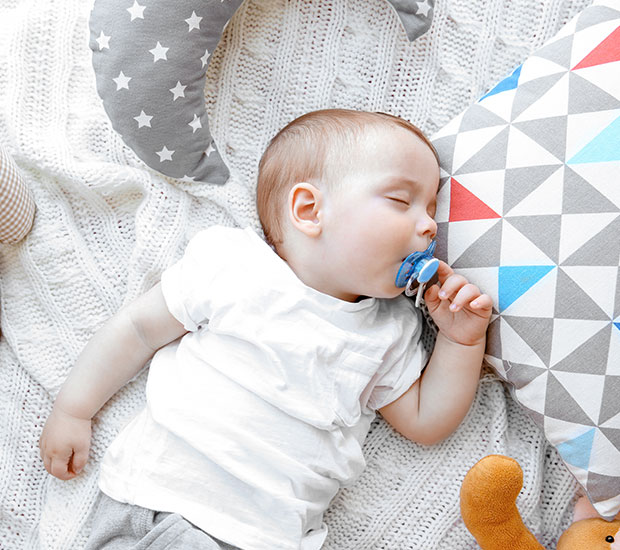Pacifiers and Thumb SuckingMiddletown, NY
For most infants, the sucking of thumbs and pacifiers is a happy, everyday part of life. Since sucking is a natural, instinctual baby habit, infants derive a sense of comfort, relaxation, and security from using a thumb or pacifier as a sucking aid.
According to research from the American Academy of Pediatric Dentistry (AAPD), the vast majority of children will cease using a pacifier before the age of four years old. Thumb sucking can be a harder habit to break and tends to persist for longer without intervention. Children who continue to suck thumbs or pacifiers after the age of five (and particularly those who continue after permanent teeth begin to emerge) are at high-risk for developing dental complications.
How can thumb sucking and pacifier use damage children’s teeth?
Pacifier and thumb sucking damage can be quite insidious. Both can be difficult to assess with the naked eye, and both tend to occur over a prolonged period of time. Below is an overview of some of the risks associated with prolonged thumb sucking and pacifier use:
Jaw Misalignment - Pacifiers come in a wide range of shapes and sizes, most of which are completely unnatural for the mouth to hold. Over time, pacifiers and thumbs can guide the developing jaws out of correct alignment.
Tooth Decay - Many parents attempt to soothe infants by dipping pacifiers in honey, or some other sugary substance. Oral bacteria feed on sugar and emit harmful acids. The acids attack tooth enamel and can lead to pediatric tooth decay and childhood caries.
Roof Narrowing - The structures in the mouth are extremely pliable during childhood. Prolonged, repeated exposure to thumb and pacifier sucking actually cause the roof of the mouth to narrow (as if molding around the sucking device). This can cause later problems with developing teeth.
Slanting Teeth - Growing teeth can be caused to slant or protrude by thumb and pacifier sucking, leading to poor esthetic results. In addition, thumb sucking and pacifier use in later childhood increases the need for extensive orthodontic treatments.
Mouth Sores - Passive sucking is much less harmful than aggressive sucking. Aggressive sucking (popping sounds when the child sucks) may cause sores or ulcers to develop.
If you do intend to purchase a pacifier:
Check out what others are saying about our Pacifiers and Thumb Sucking services on Yelp: Pacifiers and Thumb Sucking Middletown
How can I encourage my child to stop thumb or pacifier sucking?
In most cases, children naturally relinquish the pacifier or thumb over time. As children grow, they develop new ways to self-soothe, relax, and entertain themselves. When thumb sucking or pacifier use persists past the age of five, a gentle intervention may be required.
Here are some helpful suggestions to help encourage the child to cease thumb sucking or pacifier use:
Hudson Valley Pediatric Dentistry is located at 75 Crystal Run Rd Suite 235 Middletown, NY 10941.


